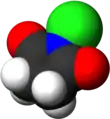N-Chlorosuccinimide
N-Chlorosuccinimide is the organic compound with the formula C2H4(CO)2NCl. A white solid, it is used for chlorinations.[2] It is also used as a mild oxidant.[3] NCS is related to succinimide, but with NCl in place of NH. The N-Cl bond is highly reactive, and NCS functions as a source of "Cl+".
| |||
| Names | |||
|---|---|---|---|
| IUPAC name
1-chloropyrrolidine-2,5-dione | |||
| Other names
Chlorosuccinimide | |||
| Identifiers | |||
3D model (JSmol) |
|||
| Abbreviations | NCS | ||
| 113915 | |||
| ChEBI | |||
| ChEMBL | |||
| ChemSpider | |||
| ECHA InfoCard | 100.004.436 | ||
| EC Number |
| ||
| 122816 | |||
PubChem CID |
|||
| UNII | |||
CompTox Dashboard (EPA) |
|||
| |||
| |||
| Properties | |||
| C4H4ClNO2 | |||
| Molar mass | 133.53 g·mol−1 | ||
| Appearance | white solid | ||
| Density | 1.65 g/cm3 | ||
| Melting point | 148 to 150 °C (298 to 302 °F; 421 to 423 K) | ||
| Hazards | |||
| GHS pictograms |   | ||
| GHS Signal word | Danger | ||
| H302, H314, H319, H335, H412 | |||
| P260, P261, P264, P270, P271, P273, P280, P301+312, P301+330+331, P303+361+353, P304+340, P305+351+338, P310, P312, P321, P330, P337+313, P363, P403+233, P405, P501 | |||
| Related compounds | |||
Related Imides |
Succinimide N-Bromosuccinimide N-Iodosuccinimide | ||
Except where otherwise noted, data are given for materials in their standard state (at 25 °C [77 °F], 100 kPa). | |||
| Infobox references | |||
Related reagents
- N-Iodosuccinimide (NIS), the iodine analog of N-chlorosuccinimide.[4]
- N-bromosuccinimide (NBS), the bromine analog of N-chlorosuccinimide.[5]
- Other N-chloro compounds that are commercially available include chloramine-T, trichloroisocyanuric acid ((OCNCl)3), 1,3-dichloro-5,5-dimethylhydantoin.[2]
Further reading
- Delaney, Paul A.; R. Johnstone (1985). "Solvent effects in the chlorination of tetrahydrothiophens with N-chlorosuccinimide". Tetrahedron. 41 (18): 3845–3851. doi:10.1016/S0040-4020(01)91405-X.
References
- N-Chlorosuccinimide at Sigma-Aldrich
- Golebiewski, W. Marek; Gucma, Miroslaw (2007). "Applications of N-chlorosuccinimide in organic synthesis". Synthesis: 3599–3619. doi:10.1055/s-2007-990871.
- Kim, Kwan Soo; I. Cho; B. Yoo; Y. Song; C. Hahn (1984). "Selective oxidation of primary and secondary alcohols using di-isopropyl sulphide–N-chlorosuccinimide". J. Chem. Soc., Chem. Commun. (12): 762–763. doi:10.1039/C39840000762.
- Beebe, T. R.; R. L. Adkins; C. C. Bogardus; B. Champney; P. S. Hii; P. Reinking; J. Shadday; W. D. Weatherford; M. W. Webb; S. W. Yates (1983). "Primary alcohol oxidation with N-iodosuccinimide". J. Org. Chem. 48 (18): 3126–3128. doi:10.1021/jo00166a046.
- Castanet, Anne-Sophie; F. Colobert; P. Broutin (2002). "Mild and regioselective iodination of electron-rich aromatics with N-iodosuccinimide and catalytic trifluoroacetic acid". Tetrahedron Lett. 43 (29): 5047–5048. doi:10.1016/S0040-4039(02)01010-9.
External links
This article is issued from Wikipedia. The text is licensed under Creative Commons - Attribution - Sharealike. Additional terms may apply for the media files.

